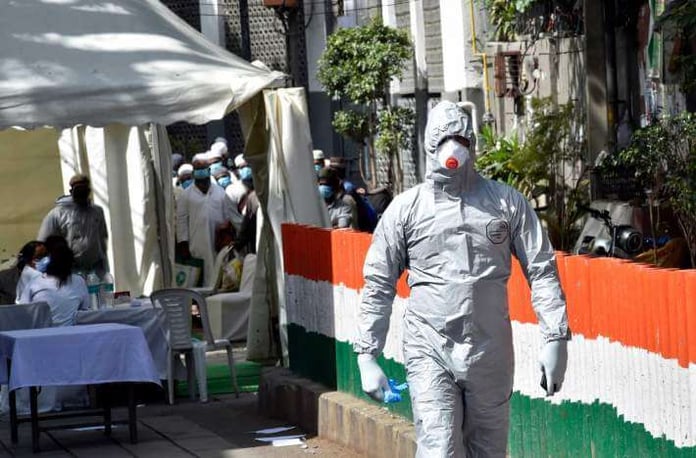The Indian media have been under pressure for some time. The government is now using the corona crisis to further restrict press freedom.
In the corona crisis, Prime Minister Narendra Modi would have to hold press conferences, answer questions and be afraid. He doesn’t do any of that.
Lav Agarwal sits on the podium in front of the journalists every day and explains to the Indians the Corona situation in the country. Not Prime Minister Narendra Modi, not Health Minister – they don’t face the media, Modi has never done that in two terms. So Agarwal, a secretary from the Ministry of Health and Family, sits three levels below the Minister of Health in the organization chart. In front of him is a handpicked group of journalists. Many were excluded, they can now send questions about the COVID 19 crisis via Whatsapp, a few will then be answered by Agarwal. But it’s never the critical questions.
During the Corona crisis, what has been observed in India for a long time is accentuated: access to information for journalists is difficult, critical media come under pressure.
It’s a terrible time to be a journalist in India,” says Swati Chaturvedi. She writes for several Indian media and has published a book that shows how the ruling party BJP is spreading false reports on social networks and intimidating opponents.
“Since then, I’ve been threatened with death and rape on social networks every day,” she says on the phone. The government does not protect the journalists. Prime Minister Narendra Modi is currently disempowering the media. In the corona crisis, he would have to hold press conferences, answer questions, and fear. He doesn’t do any of it.
Do the doctors have enough equipment? Who is being tested exactly? A journalist posted her questions to the government on Twitter. Secretary Agarwal had not answered any of these at his Corona press conference the day before.
There are approximately 17,000 daily newspapers in India, 178 news channels and numerous publications on the Internet. Only a few are critical of the government, many Hindi media report on government lines, as do the large English TV stations. The broadcaster NDTV took a critical stance towards Prime Minister Modi, reporting in English and Hindi. Then advertising revenues began to decline: Indian media depend on government advertisements and commercials, these were no longer booked, and government-related companies also withdrew advertisements.
NDTV fired around a quarter of its workforce in 2017. Last year, the English-language news portal “Scroll.in” cut almost half of the editorial staff. And the situation worsened in the Corona crisis: The large independent newspaper “Indian Express” cut wages at the beginning of the month, and it might get worse, the CEO wrote to his employees.
In this environment, many media think twice about how they want to report on the government’s course. “Self-censorship is happening on a large scale,” says journalist Chaturvedi. She used to work in the investigative team of the “Indian Express”, she says that her stories from back then would no longer appear today.
During the Corona crisis, indirect pressure on journalists has increasingly become more direct. Hours before Prime Minister Modi announced a nationwide curfew, he met with several publishers for a video conference. He reminded them that it was necessary to stick together during the crisis, and citizens wanted to be assured that the government was doing everything possible to deal with the situation. According to Modi’s website, media should prevent pessimism and panic through “positive communication”.
The Caravan magazine asked about the video conference with several participants. Some replied that they would rather not have a critical story appear at the moment. “Corona-era journalism is as friendly with the government as ever, and this article explains why,” Vinod Jose writes on Whatsapp. He is the editor-in-chief of “The Caravan”, his magazine has won awards worldwide, it remains critical because it can afford it: the owner family is wealthy.
Chaturvedi, a journalist, says: “Modi appears to be making suggestions to the media in the video conference. But it’s much more of a threat. “
Shortly after the curfew began, the government accused the media of using their reports to stir up panic among migrant workers, which is the only reason that all the people left to return to their villages on foot. The government appealed to the highest court. She demanded that the media are no longer allowed to publish anything about the Corona crisis without first making sure that the state is correct. The court decided not to interfere with freedom of expression. But it instructed media professionals to stick to the “official version”.
Several charges are already pending from politicians against journalists who had sharply criticized the government’s corona course on social networks. India ranks 140th out of 180 countries on Reporter Without Borders’ media freedom ranking. At the beginning of March, two local TV stations in the southern part of Kerala should have been switched off for 48 hours. The stations had broadcast on the February Riots in Delhi that had broken out between Hindus and Muslims, and the government had not liked the broadcasts. After protests, the ban was lifted again, the TV stations broadcast again.
“India is a semi-closed system, and it is becoming more closed every year. It will be more difficult for journalists to do their duty, ”says Jose, editor-in-chief of The Caravan. But his magazine would continue to research if there were any inconsistencies during the Corona crisis, for example, if you felt that the official number of cases was incorrect.
Swati Chaturvedi believes that the situation for journalists and the media will deteriorate after the Corona crisis, that the government is creating a new normal. “Freedom of the press in India is in danger,” she says, and then again: “It’s a terrible time to be a journalist in India.”


